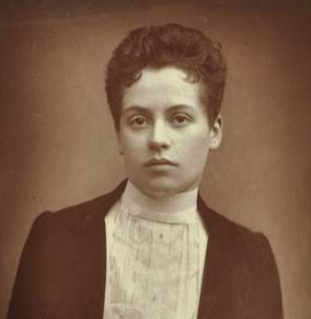Clotilde Inez Mary “Clo.” Graves was born in Buttevant, Co. Cork in 1863, and her family moved to Southsea in Hampshire when she was nine. Despite spending much of her life in England, she – like Richard Brinsley Sheridan and Anna Maria Hall – self-identified as Irish throughout her life. The extended Graves family included several notable literary and academic figures, including the poets Alfred Perceval Graves and Robert Graves and the mathematician/Anglican Bishop of Limerick, Charles Graves.
Clo., who studied visual art at the Royal Female School of Art, first found fame as a journalist. A feminist “New Woman”, she dressed in male suits, wore her hair short, smoked cigarettes, and was a keen cyclist and angler; one of her male journalist colleagues commented that she was “quite one of us”. While, as various scholars note, she never sought to “pass” as a man, the lead character in her brilliant comedy, A Mother of Three (1896), does, and she wrote bestselling fiction (including the celebrated 1910 novel The Dop Doctor) under the male pseudonym Richard Dehan.
In addition to A Mother of Three, Graves’s other big West End hits include Katherine Kavanagh (1891), Dr and Mrs Neill (1893), and – co-written with Gertrude Kingston – A Matchmaker (1896). Indeed, as Justine Nakase asserts, Graves “holds the distinction of being the first woman to have two plays running simultaneously in London: A Mother of Three and A Matchmaker, which both premiered in 1896 … Both plays premiered at significant West End venues – A Mother of Three ran at the Comedy Theatre (now the Harold Pinter Theatre) and A Matchmaker at the Shaftesbury Theatre. In other words, Graves was producing work on the main stages of the London theatre scene”.
From an Irish Studies point of view, it also worth noting that – as Ellen Dolgin, Dorothy Hadfield, and Kerry Powell have shown – Graves’s work was in conversation with that of her more famous Irish contemporaries, Oscar Wilde and Bernard Shaw. For example, A Mother of Three alludes to Wilde’s An Ideal Husband (clearly a tribute to and show of support for the recently arrested Wilde) and ultimately influenced Shaw’s You Never Can Tell and Major Barbara. (When women playwrights are written out of the record, our sense of theatre history is incomplete – and, indeed, seriously flawed.)
Sadly, Graves never made as much money from her writing as its success warranted, and she died in poverty in 1932 in the Catholic convent where she had taken up residence as a paying guest. (Raised Anglican, Graves was partially educated at a French convent school and eventually converted to Roman Catholicism in the same year that A Mother of Three premiered.) Thankfully, over recent decades, Graves’s work – after being virtually ignored for many years – has been rediscovered by scholars both within and beyond Irish Studies.
Plays
Find out more
For more on this playwright from an Irish Studies perspective, see Justine Nakase’s book chapter on her in the essay collection The Golden Thread: Irish Women Playwrights, 1716-2016 – Volume One (1716-1992).

